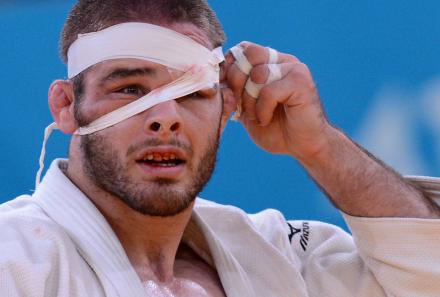Steve Scott again shows his talent for naming books (and writing them) in this phenomenal work that includes more mentions of the word "crotch" than you're likely to find anywhere else. Four Stars (out of Four)
Juji Gatame Encyclopedia
The Upshot:
As I mentioned in a previous post, this is what the Judo Masterclass books should be. It contains a wealth of knowledge with a narrow focus. He categorizes different types of Juji Gatame (spinning, head roll, hip roll, back roll, and belly down/miscellaneous), and then looks at several variations of each. He also considers transitions/combinations, defenses, and tips on levering your opponent's arm. Additionally, lots of great drill ideas are provided. There are 422 pages in this tome, with plenty of pictures and helpful descriptions. This is a must-have book that is bound to show even the most experienced player one or two new entries (or one or two hundred), and will open players' minds to the world of possibilities in Juji Gatame. I was about 10% of the way through this book when I felt that I had gotten my money's worth*, and things just got better from there.
What's In It, and How It's Organized:
- Introduction
- Drills
- Core Skills: Examines some skills that are common to almost all Juji Gatame applications
- Four Basic Entries: Introduces the spinning Juji, the head roll Juji, the back roll Juji, and the hip roll Juji
- Spinning Juji Gatame
- Back roll Juji Gatame
- Head roll Juji Gatame
- Hip roll Juji Gatame
- Traps and levers
- Juji Gatame combinations
- Transitions
- Belly down and other miscellaneous Juji's
- Defense and escapes
The Good:
First, the book provides a great framework for thinking about Juji Gatame. I have certainly seen several different entries for Juji Gatame, but I had never thought about classifying them. This systematic approach is very useful to me, particularly as an instructor, as it gives me a nice basis for grouping techniques and teaching subtle differences. As you may well guess from a book that is over 400 pages about a single move, it also provides numerous Juji Gatame entries I'd never even considered before - so that's obviously useful. I particularly appreciate the focus on levers – I guess I'm not alone in having trouble with this area of applying my Juji. And the chapter on drills, though brief for my taste, is a huge help. As he also had in
Winning on the Mat, there are history and language insights scattered throughout the book, and I really appreciate those additions - understanding the origin of a technique or concept can be invaluable to internalizing it. And Scott also added some nice flavor by sprinkling in some great quotes... one that I particularly liked was "Sometimes you have to play for a long time to be able to play like yourself,"– Miles Davis.
Could Have Been Better:
The biggest complaint I have with this book is that while it shows a million variations, it often fails to provide a good explanation of why you should do that particular variation. That is, what is the opponent doing differently that makes you choose one version over the other? And a small matter of personal preference, but I like the pictures to be shown in a series together with the accompanying text grouped together, as in
Kodakan Judo Throwing Techniques. Some of the picture sequences are disjointed, or the description doesn't match the picture, but this is pretty rare.
One Thing I Learned:
There were tons of new techniques in here that I had not thought about before – as well as improvements to techniques I already knew – but one that I liked in particular was the "Henges Hanger;" basically a way to choke your opponent while you wait to arm bar them. It's a bit lengthy to explain in detail without pictures, but the upshot is that you figure four the arm that you're trying to lever loose, and then use that to choke your opponent.
While you could certainly go your entire Judo career without ever applying Juji Gatame, that would be an absolute shame. And if you want to get better at Juji Gatame, then this book really is a must-have. And let's hope that Sensei Scott continues to make more books like this.
* Full disclosure: Mr. Scott actually provided the copy that I reviewed, so, when I mention getting my money's worth, I mean I felt like I had gotten enough value out of the book to warrant the purchase price. =:>




